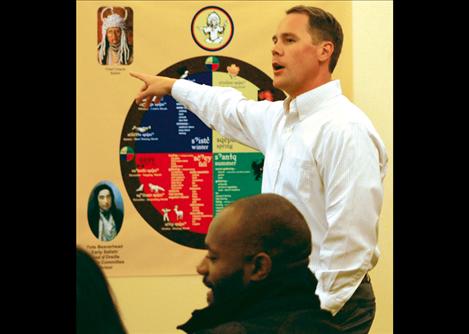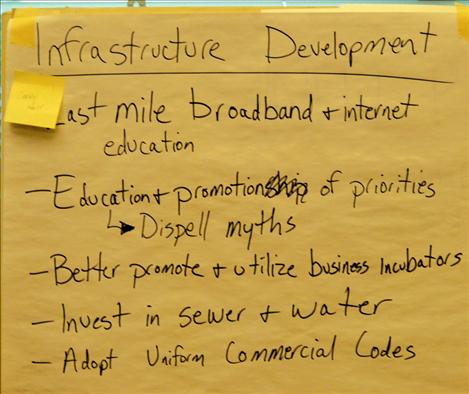Main Street Montana rolls out on reservation
Hey savvy news reader! Thanks for choosing local.
You are now reading
1 of 3 free articles.
PABLO — Collaboration and communication seemed to be common themes stressed by the participants at the Main Street Montana Project community meeting at the Confederated Salish and Kootenai Tribal council chambers on June 18. An example would be dual enrollment for high school students at Salish Kootenai College. Some Valley schools have already implemented the program and can share with others.
The Main Street Montana Project is a fairly new idea, since Governor Steve Bullock initiated it in early 2013. The goal of the project is to create a dynamic private-public partnership to build and implement a business plan for Montana by Montanans, according to the project information.
Lieutenant Governor Angela McLean kicked off the Main Street Montana Project meeting.
Introduced by CSKT Councilman Terry Pitts, McLean is not a stranger to the Mission Valley. She taught in Arlee for three years, Pitts said.
It’s all a part of making a difference and that continued circle of coming back, he explained.
To demonstrate commitment to Native Americans by the Bullock administration, McLean pointed to getting the Indian Country Economic Development Program up and running and Governor Bullock’s plan to make ICE permanent.
Then the Main Street Team rolled out the day’s agenda.
Casey Lozar, Polson graduate and Governor Bullock’s director of state tribal economics commission, facilitated the day’s work.
The stop on the Flathead Reservation is the first in a discussion at each reservation, Lozar said, congratulating the Bullock administration on realizing “every tribe has a different story, different assets and different obstacles.”
Four tables surrounded by tribal council people, tribal department heads, local business leaders and educators learned the five pillars of the Main Street Montana project: train and educate tomorrow’s workforce today; create a climate that attracts, retains and grows businesses; build upon Montana’s economic foundation; market Montana; and nurture emerging industries and encourage innovation.
Each group was given a sheet containing a list of objectives gleaned from surveys completed all over the state, at a meeting in Fort Belknap and at the Native American Development conference in Billings in 2013, all connected with the pillars. Participants were asked to discuss the objectives and select their top three, in order. As a group, they were also asked to come up with a fourth objective that wasn’t on the sheet. Group members suggested other people who could make things happen.
“The facilitator drilled down into what are the next steps,” said John Cech, Montana deputy commissioner of higher education.
Lozar said he thinks the Main Street Montana group will compile information, identifying more as they visit other tribes. That information will be used to create a state, tribal and private sector partnership.
At the end of the meeting Jason Smith, Montana director of Indian affairs, reiterated that it’s a matter of finding partners, such as the folks who sat at the tables, to build a better Montana.
Feedback from participants was positive.
“With objectives already identified, it made it easy to focus in on the needs of our tribes,” said Jami Hamel, a CSKT employee.
“I think it was worthwhile. Community partnerships are important,” said Penny Kipp, head of the CSKT education department.
Kipp hosts a quarterly meeting of all the school superintendents in the Mission Valley. The meeting would be a vehicle to carry Main Street Montana issues to the superintendents, Kipp said, and they could be discussed at each meeting.
Debra Krantz, Lake County Job Service, was talking with Kipp about programs that help kids decide what careers might be of interest.
“They’re tools,” Krantz said, “for education and the workplace — helping to share what we have and promote collaboration.”
“The meeting wasn’t overwhelming,” Kipp said. “It was tasky, well-defined and organized.”
Kipp said she also saw the commitment to come back to the Flathead Reservation demonstrated by McLean and the rest of the staff.
“This won’t be the last time you will see our team,” McLean said. “We’ll be here, working with you. This is not a one time conversation.”

















